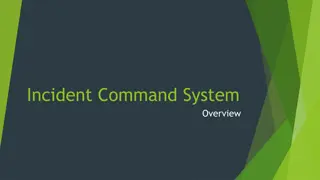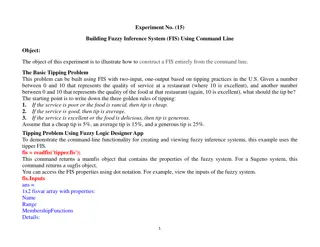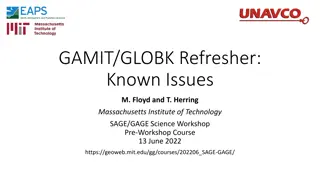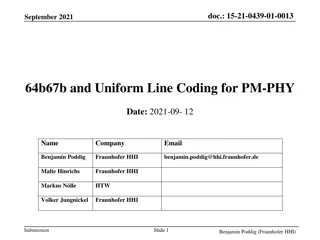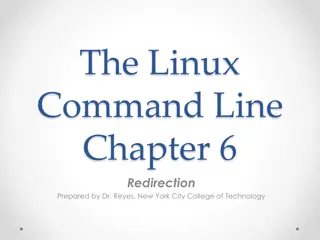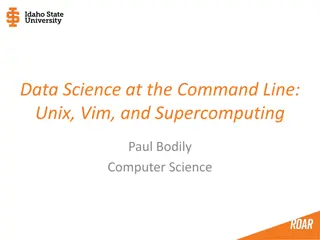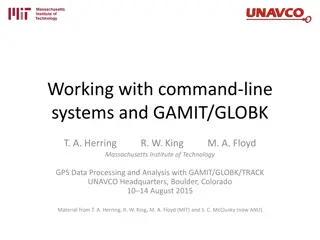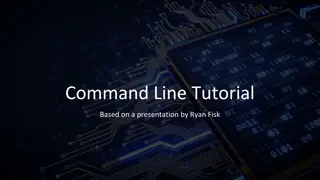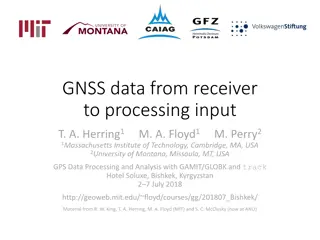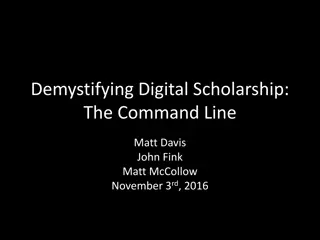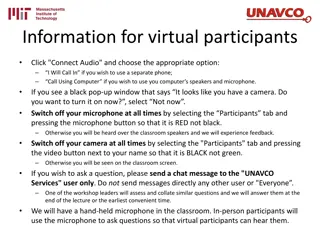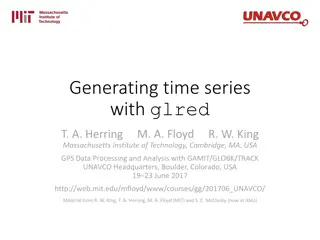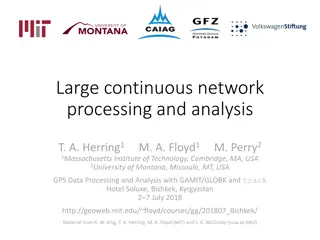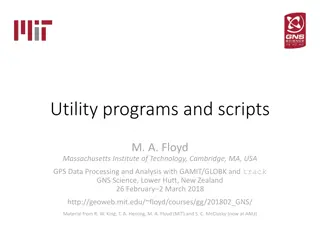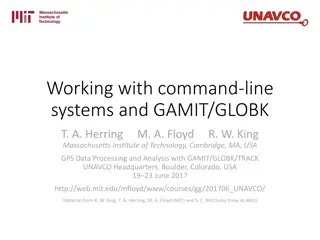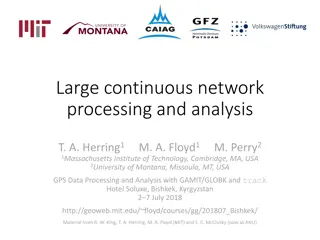Working with command-line systems and GAMIT/GLOBK
In this training program, participants will learn about directory structure, navigation, and commands in command-line systems using GAMIT/GLOBK. The course covers topics such as understanding directory layouts, moving between directories, and utilizing shell scripts for efficient command-line operations. Participants will gain practical skills for effective data processing and analysis using GNSS tools. Join us to enhance your proficiency in command-line computing and advance your geospatial data handling capabilities.
Download Presentation

Please find below an Image/Link to download the presentation.
The content on the website is provided AS IS for your information and personal use only. It may not be sold, licensed, or shared on other websites without obtaining consent from the author.If you encounter any issues during the download, it is possible that the publisher has removed the file from their server.
You are allowed to download the files provided on this website for personal or commercial use, subject to the condition that they are used lawfully. All files are the property of their respective owners.
The content on the website is provided AS IS for your information and personal use only. It may not be sold, licensed, or shared on other websites without obtaining consent from the author.
E N D
Presentation Transcript
Working with command-line systems and GAMIT/GLOBK M. A. Floyd T. A. Herring Massachusetts Institute of Technology, Cambridge, MA, USA GNSS Data Processing and Analysis with GAMIT/GLOBK and track UNAVCO Headquarters, Boulder, Colorado, USA 18 22 July 2022 https://geoweb.mit.edu/gg/courses/202207_UNAVCO/ Material from R. W. King, T. A. Herring, M. A. Floyd (MIT) and S. C. McClusky (now at ANU)
Introduction to command-line computing Directory structure and navigation Using a command line Commands to know Introduction to shell scripts 2022/07/18 Command-line systems and GAMIT/GLOBK 1
Directory structure and navigation
Directory structures One must be familiar with the layout of files and directories (or folders ) Once one has a mental map of the directory structure, navigating between directories and finding files is easier Think of it as a filing cabinet or family tree / 1a 1b 1c 2a 2b 2c 2d 3a 3b 3c 3d 2022/07/18 Command-line systems and GAMIT/GLOBK 3
Directory structures Top-level ( root ) directory (e.g. / on Unix, C:\ on Windows, etc.) User s current working directory is referred to by the shorthand . [dot] The parent directory is one level above the current working directory in the hierarchy Parent directory is referred to by the shorthand .. [double dot] / 1a 1b 1c 2a 2b 2c 2d 3a 3b 3c 3d 2022/07/18 Command-line systems and GAMIT/GLOBK 4
Changing directory Once user knows where they are with mental map of directory structure, move around. We can move up or down the hierarchy but not sideways. cd / Takes user to top-level ( root ) directory cd 1b Takes user to 1b directory in first level (move down hierarchy) cd 2c Takes user to 2c directory in second level, below 1b (move down hierarchy) cd 2d Unknown directory. Why? User attempting to move sideways but 2c not connected directly to 2d . / 1a 1b 1c 2a 2b 2c 2d 3a 3b 3c 3d 2022/07/18 Command-line systems and GAMIT/GLOBK 5
Absolute paths To move back up the hierarchy to 2d , one may explicitly start from the top level, e.g. cd / cd 1c cd 2d or, combined, simply cd /1c/2d Directories are separated by forward slashes / 1a 1b 1c 2a 2b 2c 2d 3a 3b 3c 3d 2022/07/18 Command-line systems and GAMIT/GLOBK 6
Relative paths Or: Move back up to 1b cd .. Move back up to / cd .. Move down to 1c cd 1c Move down to 2d cd 2d Or, combined, simply: cd ../../1c/2d / 1a 1b 1c 2a 2b 2c 2d 3a 3b 3c 3d 2022/07/18 Command-line systems and GAMIT/GLOBK 7
Using a command line Basic syntax is: <command> <options> <argument(s)> <command> is the program to run, including directory if not included in PATH environment variable (more in a couple of slides ) <options> are usually prepended by a dash (e.g. -a) <argument(s)> are usually input or output files to work on Commands may or may not have options or expect arguments 2022/07/18 Command-line systems and GAMIT/GLOBK 9
Basic commands cd Change directory, for navigating the directory structure pwd Print working directory, to know where you are ls List directories and files in current working directory ( . ) or directory given after command Use the tab key to auto-complete options 2022/07/18 Command-line systems and GAMIT/GLOBK 10
Environment variables A computer must be told information in order to work the way you expect Many important settings are kept in environment variables $HOME = user s home directory $PATH = list of directories containing programs $SHELL = user s command shell printenv Prints information on environment variables 2022/07/18 Command-line systems and GAMIT/GLOBK 11
Local variables To make life easier, one may also set local variables, which may be referred back to at any time Useful if one finds the need to write the same thing many times sh/bash: var='Hello' Instead of writing Hello , any reference to $var will be equivalent to Hello var=( Hello Goodbye ) Any reference to ${var[0]} will be equivalent to Hello and ${var[1]} to Goodbye csh/tcsh: set var = 'Hello' Instead of writing Hello , any reference to $var will be equivalent to Hello set var = ( Hello Goodbye ) Any reference to $var[1] will be equivalent to Hello and $var[2] to Goodbye 2022/07/18 Command-line systems and GAMIT/GLOBK 12
Everyday commands awk grep sed sort paste/join tr echo/cat 2022/07/18 Command-line systems and GAMIT/GLOBK 14
awk Powerful formatted read/write utility, e.g. awk '{print $1,$2,$3}' <file> Prints first, second and third white-spaced columns ( fields ) from each line of <file> awk -v n=3 -v FS=',' '{print $NF/n}' <csv-file> Prints the last comma-separated field divided by 3 from each line of <csv-file> awk 'BEGIN {sum=0}; {sum=sum+$1}; END {printf "%.1f\n",sum/NR}' <file> Calculate mean of first field: sums first field on each line then divides by number of lines ( records ) 2022/07/18 Command-line systems and GAMIT/GLOBK 15
grep Pattern-matching command ( general regular expression ) grep 'hello' <file> Prints all lines from <file> with occurrence of hello in them grep -ci '^POS S' <file> Prints the number ( -c ) of lines that begin ( ^ ) with POS S in either upper- or lower-case letters ( -i ) in <file> grep '^ .* P$' <file> Print all lines in <file> that begin ( ^ ) with a space, followed by any number of any characters ( .* ), and end ( $ ) with a space followed by P 2022/07/18 Command-line systems and GAMIT/GLOBK 16
sed Basic text editor sed 's/ //g' <file> Substitute ( s ) all ( g ) instances of a single whitespace with nothing (i.e. delete all whitespace) sed '/^ *$/d; s/hello/goodbye/1' <file> Delete ( d ) all empty lines and substitute the first instance of hello with goodbye on each line of <file> 2022/07/18 Command-line systems and GAMIT/GLOBK 17
sort Sorts records sort <file> Outputs basic alpha-numerically ordered <file> sort -u <file> Same as above but uniquely sorted (i.e. removes duplicate records) sort -g -k 3 <file> General numeric ordering based on third field of <file> sort -u -k 2.1,2.4 <file> Sort based on first character of second field to fourth character of second field and use this as the basis for the uniqueness test 2022/07/18 Command-line systems and GAMIT/GLOBK 18
tr Basic translation tr '[:upper:]' '[:lower:]' Transposes all upper-case letters to lower-case tr -d '\r' Deletes all carriage return ( CR ) characters (useful for changing a file s line ending from DOS to UNIX format) 2022/07/18 Command-line systems and GAMIT/GLOBK 19
echo/printf/cat Echoes the argument echo 'Help!' Prints Help! printf 'Help!\n' Prints a formatted string cat <file> Reads out entirety of <file> cat << END Help! END Same as echo 'Help!' and printf 'Help!\n' 2022/07/18 Command-line systems and GAMIT/GLOBK 20
Redirection The output from one command may be written to a file > to overwrite an existing file >> to append to an existing file sort [file] > [sorted file] or piped to another command, effectively forming the second command s input | grep '^ .* P$' [file] | sort > [grep d and sorted file] 2022/07/18 Command-line systems and GAMIT/GLOBK 21
Shorthands Top-level ( root ) directory = / , e.g. cd / Your home directory = ~ or $HOME , e.g. ls ~ Links or shortcuts may be created, e.g. ln -s /home/user/gg/10.71 ~/gg This creates a link in the user s home directory called gg that points to the directory /home/user/gg/10.71 Rather than cd /home/user/gg/10.71 , one can get to the same place simply with cd ~/gg (This is used in GAMIT/GLOBK scripts and must remain in place!) 2022/07/18 Command-line systems and GAMIT/GLOBK 22
Useful commands du Disk usage: useful if you want to know how much space your (or others !) directories are taking up df Disk free space: useful if you want to know how much disk space is used and free top Table Of Processes: useful if you want a real-time overview of processes that are running ps List processes: useful if you want to see what processes are running and their process numbers, commands, etc. 2022/07/18 Command-line systems and GAMIT/GLOBK 23
What is a script? Scripts contain a series of commands written in one file and prepended by a hash-bang #!/bin/sh for original Bourne Shell (usually the same as bash on modern systems) #!/bin/bash for Bourne Again Shell #!/bin/csh for C Shell (usually the same as tcsh on modern systems) #!/bin/tcsh for TENEX C Shell The script may then be executed to run all of the commands in sequence as written Most scripts in GAMIT/GLOBK are written in csh or tcsh; many newer scripts are written in bash Must have both csh and tcsh installed to run GAMIT/GLOBK scripts bash usually installed by default on current Linux distributions 2022/07/18 Command-line systems and GAMIT/GLOBK 25
Script example #!/bin/bash printf 'The ISO date is: ' date '+%Y-%m-%dT%H:%M:%S%Z' printf 'The mean of all numbers between 1 and 10 is: ' echo 1 10 | awk 'BEGIN {sum=0; n=0}; {for (i=$1; i<=$2; i++) {sum=sum+i; n++}}; END {print sum/n}' printf 'Goodbye!\n' 2022/07/18 Command-line systems and GAMIT/GLOBK 26
Sources of prerequisite information http://geoweb.mit.edu/gg/pre.php http://geoweb.mit.edu/gg/docs/GG_Quick_Start_Guide.pdf http://geoweb.mit.edu/~floyd/computing/mac/gfortran/ http://geoweb.mit.edu/~floyd/computing/mac/gv/ 2022/07/18 Command-line systems and GAMIT/GLOBK 28
Separation of tasks Source code directory Installation directory Processing directory 2022/07/18 Command-line systems and GAMIT/GLOBK 29
Source code directory (optional)
Source code directory Users may wish to keep a local copy of source code As backup in case of problems during installation If unable to reconnect to the source code repository (ftp://chandler.mit.edu) If you wish to do this, keep it separate from where you intend to install GAMIT/GLOBK, e.g. ~/src/gg/10.71 ~/Applications/src/gg/10.71 2022/07/18 Command-line systems and GAMIT/GLOBK 31
Main installation directory Choose a suitable directory for installing the software Suggested place in home directory, e.g. ~/src/gg, ~/Programs/gg, etc. (for example, I install GG version 10.71 in /Users/maf/Applications/gg/10.71) Alternative may be your /usr/local directory, e.g. /usr/local/gg/10.71 but you must have administrator permissions Take great care not to mix source versions, e.g. 10.70 versus 10.71 Change to this directory to download (or copy) the source code This will be the directory that is ultimately linked from your home directory (~/gg) 2022/07/18 Command-line systems and GAMIT/GLOBK 33
FTP server chandler.mit.edu username: guest password: [changeable] Use curl or wget or an FTP client, such as ftp or ncftp Internet browsers generally do not allow connection to FTP domains nowadays, e.g. ftp://guest@chandler.mit.edu 2022/07/18 Command-line systems and GAMIT/GLOBK 35
Source code Change directory to updates/source/ Need at least: com gamit help kf libraries tables incremental_updates (if any) Also download install_software Depending on your processing strategy, may also need to download grids (e.g. ocean-tide loading, atmospheric loading grids, etc.) from ftp://everest.mit.edu/pub/GRIDS/ 2022/07/18 Command-line systems and GAMIT/GLOBK 36
Updates! Incremental updates are made available approximately every month, so please check at least Earth orientation parameters (pole.* and ut1.*; or sh_update_eop) SVN-PRN translation tables (svnav.dat) Differential code biases (dcb.dat) Leap seconds (leap.sec) Loading grids (ftp://everest.mit.edu/pub/GRIDS/) Example: 2016-12-31T23:59:60Z leap second 2022/07/18 Command-line systems and GAMIT/GLOBK 38
Documentation Top-level README file at ftp://guest@chandler.mit.edu/updates/README Change directory to updates/documentation/ GAMIT/GLOBK prerequisites in GAMIT_prerequisites.pdf http://geoweb.mit.edu/gg/pre.php ftp://guest@chandler.mit.edu/updates/documentation/GAMIT_prerequisites.pdf Quick Start Guide in GG_Quick_Start_Guide.pdf http://geoweb.mit.edu/gg/docs/GG_Quick_Start_Guide.pdf Introductory GPS material in Intro_GG.pdf http://geoweb.mit.edu/gg/docs/Intro_GG.pdf ftp://guest@chandler.mit.edu/updates/documentation/Intro_GG.pdf GAMIT reference manual in GAMIT_Ref.pdf http://geoweb.mit.edu/gg/docs/GAMIT_Ref.pdf ftp://guest@chandler.mit.edu/updates/documentation/GAMIT_Ref.pdf GLOBK reference manual in GLOBK_Ref.pdf http://geoweb.mit.edu/gg/docs/GLOBK_Ref.pdf ftp://guest@chandler.mit.edu/updates/documentation/GLOBK_Ref.pdf 2022/07/18 Command-line systems and GAMIT/GLOBK 39
Required tools Depending on your system, a number of programs may need to be added. One needs: A Fortran code compiler (e.g. gfortran) A C code compiler (e.g. gcc or clang on macOS) X11 libraries and headers, specifically: libX11.a, libX11.so, libX11.dylib, libX11.la or libX11.dll.a (depending on your system) Xlib.h Linux Be sure a C-shell (csh and tcsh) is installed (this is not the case by default with Ubuntu, for instance) X11 libraries and headers may also need to be installed Mac Download the latest Command Line Tools (Mac OS X 10.7.3 or later) X11 was replaced by XQuartz (https://www.xquartz.org/) for Mac OS X 10.8 (Mountain Lion) and later Windows Ubuntu on VirtualBox or VMWare virtual machine (or Windows Subsystem for Linux on recent versions of Windows 10): sudo apt install gfortran make libx11-devel csh tcsh bc Cygwin: Devel/make; Math/bc; Shells/tcsh; X11/libX11 (or X11/xinit) 2022/07/18 Command-line systems and GAMIT/GLOBK 41
Notes on known problems Very new gfortran releases, especially those with a version number ending in 0 (e.g. 4.9.0), sometimes are buggy and produce compilation problems If this is the case, try compiling a program using only the -O3 flag or revert to an older, stable version of gfortran Currently running gfortran 8.2.0 on laptop with macOS 10.15 (Catalina) and 4.6.3, 4.8.4 or 7.5.0 on MIT computers with Ubuntu Linux See http://geoweb.mit.edu/gg/issues.php 2022/07/18 Command-line systems and GAMIT/GLOBK 42
Running install_software From the main installation directory, where the source tar-files and install_software should be copied Run ./install_software As you pass through the installation process, please read the questions, e.g. Searching directories set in libraries/Makefile.config for X11 installation Verified these paths to X11 libs and includes X11LIBPATH: X11INCPATH: Are these paths complete and correct for your system? (y/n) If they are not correct, say n then install_software will search or exit and one can then edit libraries/Makefile.config appropriately 2022/07/18 Command-line systems and GAMIT/GLOBK 43
A note here on permissions A computer may read ( r ), write ( w ) and/or execute ( x ) a directory or file Each action may be allowed by a user ( u ), group ( g ) or others ( o ) A computer must follow instructions, called permissions , on if it allowed to do any or all of these for any Any file that you want to run as a program must be made executable chmod a+x <file> Change moderations (permissions) so executable ( x ) permissions are added to <file> for all ( ugo ) You may find you need to verify that directories and files are readable, writable and/or executable as necessary throughout your UNIX experience 2022/07/18 Command-line systems and GAMIT/GLOBK 44
Potentially necessary edits libraries/Makefile.config is the main control file for the installation process Check: X11LIBPATH (path to libX11) X11INCPATH (path to Xlib.h) MAXSIT (max. number of sites to process simultaneously) MAXSAT (do not change) MAXATM (max. atmospheric estimates per session) MAXEPC (max. epochs per session, e.g. 24 hours at 30 s interval = 2880 measurement epochs) OS block (usually no need to change) 2022/07/18 Command-line systems and GAMIT/GLOBK 45
Setting environment variables sh/bash (e.g. in ~/.bash_profile, ~/.bashrc or ~/.profile): gg= /Users/maf/Programs/gg/10.71 PATH="$gg/com:$gg/gamit/bin:$gg/kf/bin:$PATH"; export PATH HELP_DIR="$gg/help/"; export HELP_DIR INSTITUTE= MIT ; export INSTITUTE csh/tcsh (e.g. in ~/.cshrc): set gg = /Users/maf/Programs/gg/10.71 setenv PATH "$gg/com:$gg/gamit/bin:$gg/kf/bin:$PATH" setenv HELP_DIR "$gg/help/" setenv INSTITUTE MIT 2022/07/18 Command-line systems and GAMIT/GLOBK 46
Additional environment variables Some locales (your computer s language and numbers setting) use a comma for the decimal separator rather than a point, e.g. 1000.00 versus 1000,00 for one thousand to two decimal places This is typical in many languages other than English Using this scheme breaks certain GAMIT/GLOBK scripts that perform basic numeric calculations while formatting data, as well as GMT To avoid this problem without having to change your language, set the LC_NUMERIC environment variable to C or an appropriate language locale, e.g. en_GB.UTF-8 or en_US.UTF-8 sh/bash (e.g. in ~/.bash_profile, ~/.bashrc or ~/.profile): LC_NUMERIC= C ; export LC_NUMERIC csh/tcsh (e.g. in ~/.cshrc): setenv LC_NUMERIC C 2022/07/18 Command-line systems and GAMIT/GLOBK 47
Processing directory The processing directory will not have the same structure as the main installation directory Choose a different location, do not process in your main installation directory We will, however, be copying or linking to the main installation tables (via symbolic link or shortcut ~/gg/tables) 2022/07/18 Command-line systems and GAMIT/GLOBK 49
Example continuous GPS structure Project level SoCal Year level 2007 2008 2009 2010 2011 2012 2013 vsoln Day level 001 365 brdc gfiles gsoln igs rinex tables 2022/07/18 Command-line systems and GAMIT/GLOBK 50



